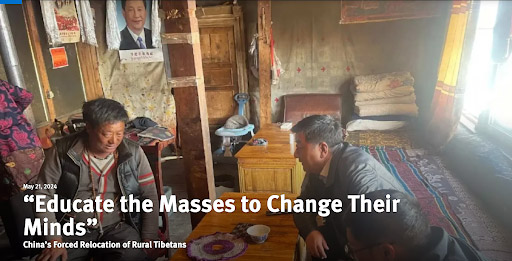(Human Rights Watch): Chinese government officials are systematically using extreme forms of pressure to coerce rural Tibetans to relocate their long-established villages, Human Rights Watch said in a report released today. Since 2016, officials in the Tibet Autonomous Region have relocated or are currently relocating 500 villages with over 140,000 residents to new locations, often hundreds of kilometers away.
The 71-page report, “‘Educate the Masses to Change Their Minds’: China’s Coercive Relocation of Rural Tibetans,” details how participation in “whole-village relocation” programs in Tibet, in which entire villages are relocated, amounts to forced eviction in violation of international law. Officials misleadingly claim that these relocations will “improve people’s livelihood” and “protect the ecological environment.” The government prevents relocated people from returning to their former homes by generally requiring them to demolish these homes within a year of relocating.
“The Chinese government says that the relocation of Tibetan villages is voluntary, but official media reports contradict this claim,” said Maya Wang, acting China director at Human Rights Watch. “Those reports make clear that when a whole village is targeted for relocation, it is practically impossible for the residents to refuse to move without facing serious repercussions.”
The report draws on over 1,000 official Chinese media articles published between 2016 and 2023. It includes three case studies, including video footage, that show in detail the arguments and methods Chinese officials use to obtain the “consent” of residents to relocate their villages.
In addition to programs that relocate entire villages, officials in Tibet also use a form of relocation known as “individual household relocation.” This typically involves officials selecting poorer households for relocation to sites deemed more suitable for income generation. The government relocated 567,000 people under this program in Tibetan areas of China between 2016 and 2020.
While such mass relocations of residents have been occurring elsewhere in poor rural areas in China, these drives risk causing a devastating impact on Tibetan communities, Human Rights Watch found. Together with current Chinese government programs to assimilate Tibetan schooling, culture, and religion into those of the “Chinese nation,” the relocation of rural communities erode or cause major damage to Tibetan culture and ways of life – not least because most relocation programs in Tibet move former farmers and pastoralists to areas where they cannot practice their former livelihood and have no choice but to seek work as wage laborers in off-farm industries.
“The mass relocations of rural Tibetan villages are severely eroding Tibetan culture and ways of life,” Wang said. “China’s government should suspend relocations in Tibet until an independent, expert review of existing policies and practices is carried out to determine their compliance with Chinese law and standards and international law concerning relocations and forced evictions.”
For More:
Download the full report


